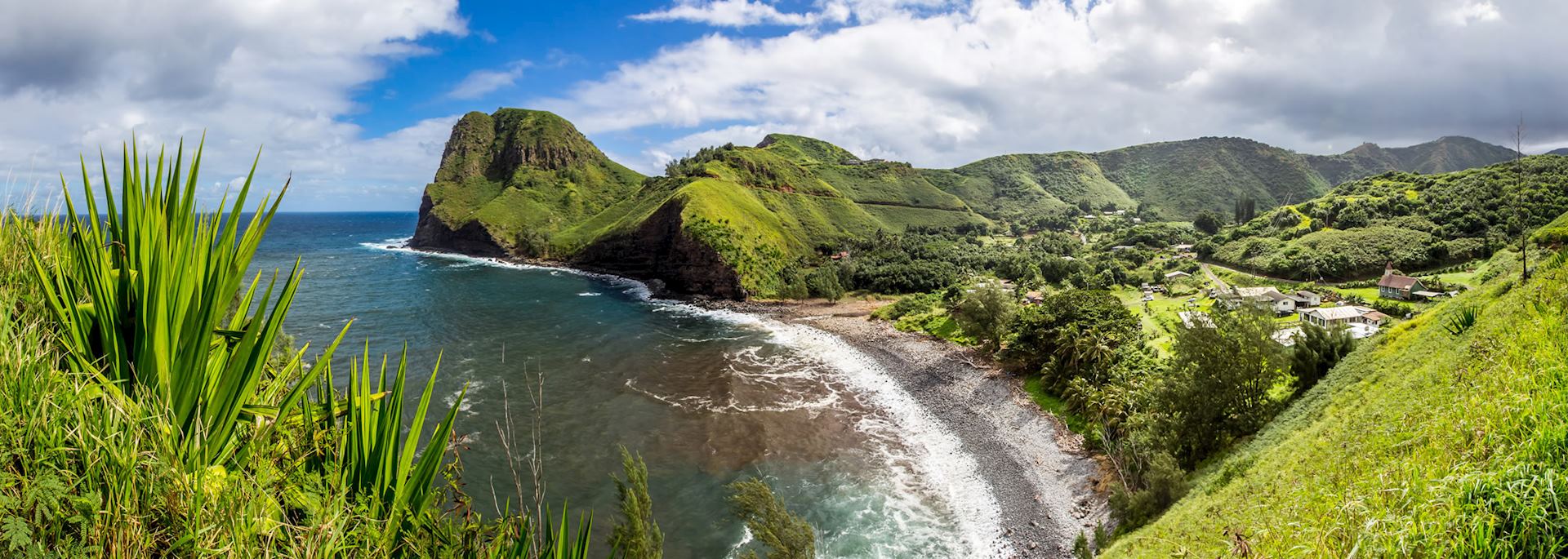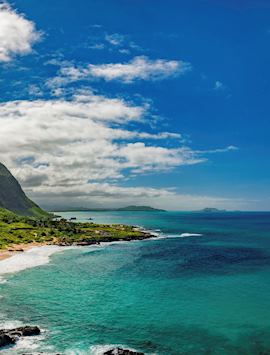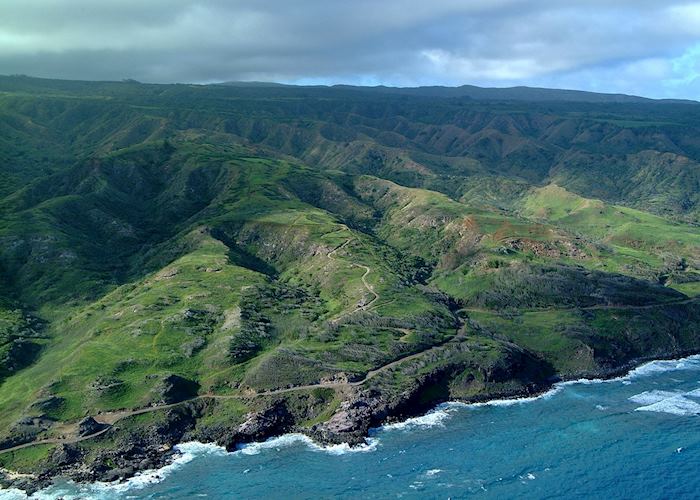Jump to:
Legend has it the Hawaiian goddess Laka gave birth to the dance of hula in Ka’ana, on Molokaʻi. While other stories place the Island of Hawaiʻi as hula’s birthplace, Molokaʻi seems more plausible. Here, the spirit of Hawaii’s traditional Polynesian culture lives on in outrigger canoe races, old heiau (temples), and myths passed between generations.
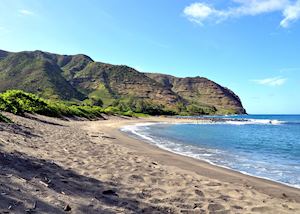 We recommend spending a few days here as part of a wider Hawaii trip. It will give you time to explore the island by hiking its trails, which lead to waterfalls and beaches. Or, if you’re short on time, there’s the option to see Molokaʻi’s cliffs, waterfalls and valleys from the air on a helicopter ride from Maui.
We recommend spending a few days here as part of a wider Hawaii trip. It will give you time to explore the island by hiking its trails, which lead to waterfalls and beaches. Or, if you’re short on time, there’s the option to see Molokaʻi’s cliffs, waterfalls and valleys from the air on a helicopter ride from Maui.
Compared with the other main islands (with the exception of smaller Lānaʻi), Molokaʻi sees far fewer visitors and remains relatively untouched by development. The locals, and those who do make the effort to visit, like it this way.
Here, you get a true sense of Hawaiian culture — about 50% of islanders are partially native Hawaiians, whose heritage is proudly protected and celebrated.
Visit in January and you might catch the Ka Molokaʻi Makahiki Festival. The Makahiki was traditionally a period of peace and festivities following harvest. Residents now celebrate with Hawaiian games (both land- and ocean-based), arts and crafts, sporting competitions and traditional dance.
Every October, the island plays host to the Molokaʻi Hoe, an outrigger canoe race that sees contestants paddle across the Ka'iwi Channel from Kawakiu Bay on Molokaʻi's west coast to Waikīkī Beach on Oʻahu. You can watch from the shore as teams take to the water for the four-and-a-half-hour race through the waves.
And, on the third weekend of May, you can celebrate hula at the annual Moloka'i Ka Hula Piko festival. Talks tell you more about the island’s culture and traditions, you can sample local food and buy handmade crafts, and local dance groups showcase the art of hula.
Life on the ‘friendly island’, as it’s called across the archipelago, is slow and relaxed. Large swathes of sand shaded by palms provide space to unwind, with interludes for snorkelling, diving or fishing in the clear turquoise water. Whale-watching trips can be arranged locally between December and May, when humpbacks migrate to the surrounding waters to have their young.
With no public transport, driving and hiking are the best ways to explore the island.
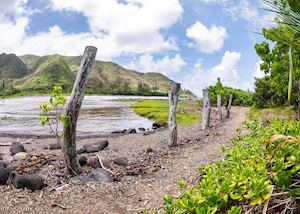 We like the trail that cuts through Hālawa Valley, in the east of the island. The 5.5 km (3.5 mile) round trip takes you through a forested valley believed to have been one of the first places on the island settled by Polynesians, more than 1,000 years ago. Guides can be arranged locally to lead the way and impart historical insights.
We like the trail that cuts through Hālawa Valley, in the east of the island. The 5.5 km (3.5 mile) round trip takes you through a forested valley believed to have been one of the first places on the island settled by Polynesians, more than 1,000 years ago. Guides can be arranged locally to lead the way and impart historical insights.
You’ll come across the remains of heiau (historic stone temples) dotted along the route, as well as old irrigation channels, walls and terraces.
After crossing streams and brushing past leaves larger than your head, you reach Moa‘ula Falls. It pours forcefully down the valley side in two tiers, plummeting into a deep pool where you can take a dip.
Purdy’s Natural Macadamia Nut Farm, in central Molokaʻi, is a family-run concern owned by Tuddie and Kammy Purdy. They welcome visitors onto their property to crack and taste their home-grown macadamia nuts. They’ll show you around their orchard and demonstrate how to crack open the nuts using old Molokaʻi techniques, all the while chatting to you about life on the island.
Just a short drive east of the farm is the Kalaupapa National Historical Park. This peninsula is surrounded by ocean and separated from the rest of the island by steep cliffs. These isolated conditions led to it being chosen as a leprosy settlement in the mid-19th century.
You can stand at the top of the sea cliffs here (the world’s highest) to take in sweeping views over the ocean and coastline, backed by valleys and mist-shrouded mountains.
At sunset, head to west-coast Pāpōhaku Beach. From this 5 km (3 mile) stretch of often-deserted toffee-hued sand, you can watch the sun melt into the horizon, the sky ablaze with reds, oranges and deep purples.
Best time to visit Molokaʻi
Molokaʻi enjoys a warm, tropical climate, and you can visit at any time of year. You may want to coincide your stay with the whale watching season (December to May), though it can be rainy for the first few months. Alternatively, time your visit with one of the Hawaiian festivals held on the island, bearing in mind that it will be busier at these times.
who's been there
-
01993 838 92501993 838 863
- Make an enquiry
Suggested itinerary featuring Molokaʻi
This sample itinerary will give you an idea of what is possible when you travel in Molokaʻi, and showcases routes we know work particularly well. Treat this as inspiration, because your trip will be created uniquely by one of our specialists.
Places near Molokaʻi
- Lānaʻi 23 miles away
- Maui 51 miles away
- Oʻahu 55 miles away
- The island of Hawaiʻi 144 miles away
- Kauaʻi 172 miles away
Photos of Molokaʻi
Accommodation choices for Molokaʻi
We've selected a range of accommodation options for when you visit Molokaʻi. Our choices usually come recommended for their character, facilities and service or location. Our specialists always aim to suggest properties that match your preferences.
-
![Aqua Hotel Molokai, Molokai]()
Hotel Molokai
Molokaʻi

